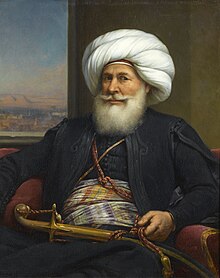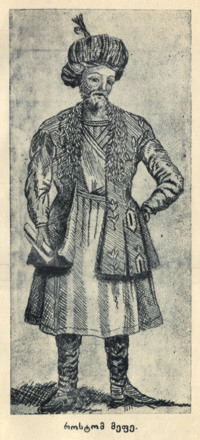This articleneeds additional citations forverification.(February 2018) |
Wāli,Wā'līorvali(fromArabic:واليWālī) is an administrative title that was used in theMuslim world(including theRashidun,UmayyadandAbbasidcaliphatesand theOttoman Empire) to designate governors ofadministrative divisions.It is still in use in some countries influenced by Arab or Muslim culture. The division that aWāligoverns is calledWilayah,orVilayet(Ottoman Empire).


Algerian term
editInAlgeria,awāliis the "governor"and administrative head of each of the58 provincesof the country, and is chosen by thepresident.
Iranian term
editInIran,Vālirefers to the governor-general or local lord of an important province. During theSafavidreign 1501-1722 the former rulers of the then subordinated provinces of the GeorgianKartliandKakhetikingdom, the Kurdish emirate ofArdalan,the chiefs ofLorestān Provinceand ofKhuzestan Provincein westernIranwere regarded as hereditary governor-generals titledVāliequal to theBeylerbeylik (Safavid Persia).These "lords of the marches" should protect Iran's western borders against foreign powers. During theQajarrule 1785-1925 thekingdom of Georgiawas lost to Russia and the hereditary lords were replaced by officials of the central power. Mainly these officials came from the group of imperial princes and royal notables and were made Vāli of important provinces. For example, thecrown princebore traditionally the title of Vāli ofAzerbaijan (Iran).
Ottoman Empire term
editVali(translated as "gouverneur-général" in French,[1][note 1]such as in theOttoman constitution) was the title in the Ottoman Empire of the most common type of Ottomangovernor,in charge of avilayet(inOttoman Turkish), often a military officer such as apasha;seeSubdivisions of the Ottoman Empire.The form used in some parts of the empire wasWali.
Omani Sultanate term
editTheSultanate of Oman,when it ruledMombasa,Kenya,appointed awalifor the city known locally asLiWali.The term is still used today to denote settlements of Oman, such as theWilayatMadha,a settlement that intersects the road betweenMadaminSharjahandHattainDubaiin the United Arab Emirates (UAE). Many Rulers of theTrucial States(also called Trucial Oman in the past) appointedwalisto look after towns on their behalf, including employing slaves for that purpose.
Moroccan term
editSince 1997 regionalisation reform, aWāliis the governor of one of the twelveregions of Morocco.
Pakistani term
editInPakistan,the rulers of the former princely state ofSwatwere given the title ofWali.
Philippine term
editIn thePhilippines,the termWa'līis the name for the titular head ofBangsamoro Autonomous Region in Muslim Mindanao,an autonomous region in the large southern island ofMindanao.TheWa'līhave ceremonial functions and powers such as moral guardianship of the territory and convocation and dissolution of itsparliament.[4]
Tunisian term
editInTunisia,awāliis the "governor"and administrative head of each of the24 provincesof the country, and is chosen by thepresident.
Turkish term
editIn Turkey a Vali is a provincial governor of one of the 81Turkish provinces.He is nominated by the interior minister and appointed by the president. A Vali supervises the functioning of the state functions such as security and maintenance and oversees also the elected provincial and municipal councils. During theOHALState of emergency from 1987 to 2002, there existed a so called Super Vali who oversaw the Valis of up to 13 provinces in southeast Anatolia.[5]
See also
editNotes
edit- ^Some translations in languages used by ethnic minorities:
- Armenian:կուսակալ (kusakal;meaning "governor" )[1]
- Bosnian:the expression is adapted to the local idiom and read "valija"
- Bulgarian:The Bulgarian version of theOttoman Constitution of 1876had used "vali", with glaven upravitel (meaning "governor-general" ) as an explanation.[2]
- Greek:γενικός διοικήτης(genikos dioikētēs), νομάρχης (nomarchēs,which may mean "nomarch"or" prefect of department ") or also" valē ",[1]βαλή[3]
- Ladino:governador de provinsiya[1]
References
edit- ^abcdStrauss, Johann (2010). "A Constitution for a Multilingual Empire: Translations of theKanun-ı Esasiand Other Official Texts into Minority Languages ". In Herzog, Christoph; Malek Sharif (eds.).The First Ottoman Experiment in Democracy.Würzburg:Orient-Institut Istanbul.pp. 21–51.(info page on bookatMartin Luther University) // Cited: pp. 41–43 (PDF pp. 43–45/338).
- ^Strauss, Johann (2010). "A Constitution for a Multilingual Empire: Translations of theKanun-ı Esasiand Other Official Texts into Minority Languages ". In Herzog, Christoph; Malek Sharif (eds.).The First Ottoman Experiment in Democracy.Würzburg:Orient-Institut Istanbul.pp. 21–51.(info page on bookatMartin Luther University) // Cited: p. 48 (PDF p. 50/338).
- ^Strauss, Johann (2010). "A Constitution for a Multilingual Empire: Translations of theKanun-ı Esasiand Other Official Texts into Minority Languages ". In Herzog, Christoph; Malek Sharif (eds.).The First Ottoman Experiment in Democracy.Würzburg:Orient-Institut Istanbul.pp. 21–51.(info page on bookatMartin Luther University) // Cited: p. 45 (PDF p. 47).
- ^Kabiling, Genalyn (11 September 2014)."PNoy submits draft Bangsamoro law Entity to have 58 exclusive powers; UN, Canada hail move".Manila Bulletin. Manila Bulletin.Retrieved2 February2015.
- ^Jongerden, Joost (2007).The Settlement Issue in Turkey and the Kurds.Brill. pp.138–141.ISBN978-90-47-42011-8.